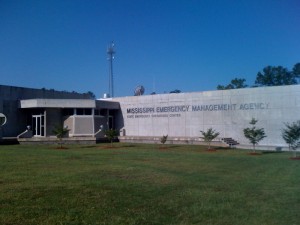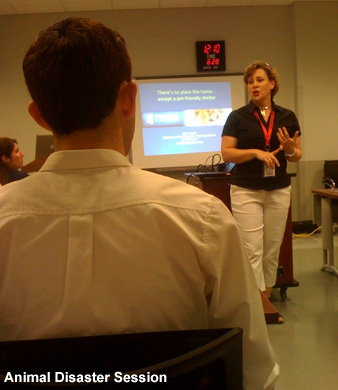Part 4: Volunteering: How It Really Works
Tuesday, July 6, 2010

The Mississippi Emergency Management Agency (MEMA) headquarters, just outside of Jackson, MS, looks like a concrete bomb shelter. If anything catastrophic ever happens in northern Mississippi, you can bet that this is the best place to be.
I was here to take a course in Volunteers in Disaster Animal Health Training, and I was FINALLY going to get answers to the questions I’ve been asking since the very beginning. I ended up getting a lot more than I bargained for. This seminar was one of the most comprehensive training sessions I have ever attended: everything from procedures to follow in public health emergencies, to incident command structure, to disaster preparedness at home, to volunteer organizations in disaster relief. I’ll just comment on the last of these: volunteering in a disaster.
When I’d driven down to help on the Mississippi Gulf Coast, everywhere I went, I was told that BP was insisting that anyone working on this oil spill be under contract. Volunteer organizations were being inundated with phone calls and emails from across the country and around the world – ALL from people who sincerely wanted to help, but couldn’t. We all wanted to help out. We love our Gulf Coast, and can’t bear to stand by and do nothing while everything we know and love is drenched in oil. Our Gulf, our beaches, our dolphins, our pelicans, our sea turtles, all washing up dead on our shores – soaked in gooey black poison. What is killing them is killing us, and all we have been able to do is stand by and watch. And wait. Wait for a call or an email that never comes. Now I know why.
Logistics and logistics
 In the end, it is all about logistics and qualifications. The U.S. Fish and Wildlife Service is in charge, because this disaster spans five states. Federal permits are required to be an official wildlife handler in this emergency, and only qualified individuals will be allowed to participate in wildlife rescue. Catching and cleaning birds and other wildlife is highly stressful to the animals, and is not something to be done by just anybody who wants to help out. Broken legs, wings, and worse can be caused by the best of intentions, so good intentions don’t cut it. Those of us not trained to do this properly are likely to do more harm than good, and none of us want that.
In the end, it is all about logistics and qualifications. The U.S. Fish and Wildlife Service is in charge, because this disaster spans five states. Federal permits are required to be an official wildlife handler in this emergency, and only qualified individuals will be allowed to participate in wildlife rescue. Catching and cleaning birds and other wildlife is highly stressful to the animals, and is not something to be done by just anybody who wants to help out. Broken legs, wings, and worse can be caused by the best of intentions, so good intentions don’t cut it. Those of us not trained to do this properly are likely to do more harm than good, and none of us want that.
Also, because many of these animals are “endangered,” each of their carcasses is a piece of evidence in an ongoing investigation. The proper chain of custody must be maintained, and they are all being bagged, tagged, and accounted for by the government.
So how does one volunteer for this oil spill disaster? Well, that depends on what you are qualified to do. MEMA has all of us potential volunteers broken down into two groups: Affiliated Volunteers and Convergent Volunteers.
Affiliated Volunteers belong to an organization that has been accredited by the state in disaster relief. Members are all trained in disaster response protocols and “speak the same language” as other official responders on the scene (acronyms, etc.) One example of an Affiliated Volunteer Organization is MART – Mississippi Animal Response Team. This group is made up of volunteer veterinarians, animal handlers, and other first responders around the state. I took only one of the three required courses to be a MART volunteer, so the training is intense.
Convergent Volunteers are people who just want to help out. The Audubon Society is just one group of Convergent Volunteers on the coast. Audubon has pioneered the Gulf Coast Bird Survey, and is deploying volunteers along the entire Gulf Coast from Texas to Florida to watch out for and report oiled, injured, or beached animals. More than 30,000 people have signed-up to volunteer, and Audubon has only been able to contact 13,000 of those so far. If you are on their list, they are going to contact you.
Volunteer opportunities are actually quite plentiful on the coast. Hands on Mississippi has many opportunities to help through their Americorps Program. The Institute for Marine Mammal Studies is recruiting. And The American Red Cross not only gives courses in Human and Pet First Aid, but is always looking for volunteers as well. There is MART if you have the right animal training.
I also signed-up with Mississippi’s Volunteers in Preparedness Registry (VIPR). VIPR is the state’s official list of medical and non-medical support volunteers and first responders. In times of crisis, these are the first people who will get the call. You can learn more at the MS State Department of Health website or call 1.866.458.4948.
You can keep track of most volunteer activities in the State of Mississippi at The Mississippi Commission for Volunteer Services website. I think my new friends at Hands on Mississippi put it best: “Be the Change – Volunteer”
